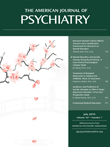Disguised Depression Deserves a Diagnosis
To the Editor: Dr. Wakefield et al. (1) examined the impact of clinical significance criteria for major depression on the occurrence of false positives. I have a related but different concern. While I am not aware of any data on the frequency with which this occurs, we all know of tragic incidents in which people who manifest no outward signs of depression commit suicide. Not all of these individuals are depressed, but some are. Some high-functioning people are able to present a completely normal face to the world, kiss their mates and children goodbye in the morning, smile at their co-workers, complete their tasks, and then take an overdose or hang themselves. How will we and DSM-5 address the reality of very depressed people who exhibit no outward signs of social withdrawal, inability to concentrate (though they may feel they cannot), changes in appetite (though they may have no appetite), loss of energy, or sadness?
1 : Does the DSM-IV clinical significance criterion for major depression reduce false positives? Evidence from the National Comorbidity Survey Replication. Am J Psychiatry 2010; 167:298–304 Link, Google Scholar



